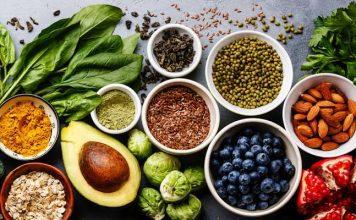Collagen plays a crucial role in our ligaments and connective tissues as it is rich in properties that promote wound healing and enhance skin health. Its benefits include reducing wrinkles, improving skin texture, and aiding muscle recovery.
Experts have unveiled five foods that can effectively diminish wrinkles and fine lines by boosting collagen levels and enhancing skin appearance. Collagen is a vital element of our ligaments and connective tissues with exceptional properties that promote wound healing and elevate skin health.
It not only diminishes wrinkles but also enhances overall skin texture and facilitates muscle recovery. Numerous studies indicate that collagen supports healthy skin by enhancing elasticity, hydration, and reducing the visibility of wrinkles and fine lines.
While some may believe that increasing collagen levels is solely achieved through skincare products, it is important to note that one’s diet can also have a significant influence.
Many individuals may not be aware that the foods they consume can greatly affect the production and absorption of collagen. In order to optimize your dietary intake, Dr. Dave Reilly, a senior scientist at Absolute Collagen, has highlighted five collagen-rich foods that are essential for enhancing collagen levels, as reported by Bristol Live.
He stated ,”It’s no secret that the food we eat has a direct impact on our health and wellbeing. And aiming to have a balanced diet and being more conscious of the nutrients in your food will not only benefit your overall wellbeing, but it can specifically aid collagen production too. As you age and your collagen production depletes, making small changes to include more collagen-boosting ingredients into your meals will have a real benefit to the appearance and strength of your skin.
“In addition to making more collagen-conscious choices during your food shop, one of the easiest and most effective ways to incorporate boost this essential protein is by taking collagen supplements.”
1. Chicken
Did you know that chicken is vital for collagen production? The amino acids and minerals found in this popular meat are perfect for supporting efficient collagen function in your body. Research suggests that chicken bone collagen peptides could be beneficial as an anti-aging nutritional component.
Studies have also indicated that bone broth and chicken feet, which are rich in collagen due to their cartilage content, can be excellent sources of this essential protein.
2. Egg whites
Egg whites are commonly used by fitness enthusiasts for their protein content, but they offer more than just muscle recovery benefits. Rich in the amino acid proline, essential for collagen production, egg whites can contribute to healthy and glowing skin.
They also contain glycine, another vital building block for collagen. Incorporating egg whites into your diet is simple, as you can substitute them for whole eggs in recipes at a ratio of 1:2 or 1:3.
3. Berries
With the arrival of warmer weather, the abundance of berries in season becomes apparent. These delicious fruits not only tantalize your taste buds but also provide a rich source of vitamin C, known for its collagen-boosting properties.
Studies have shown that a single cup of strawberries can fulfill over 100% of your daily recommended vitamin C intake. As late spring brings strawberries and specific types of blackberries, adding them to your morning granola or enjoying them as a snack can help increase your collagen levels.
4. Garlic
Garlic is packed with sulphur compounds crucial for collagen fiber formation and skin tissue maintenance. Research has demonstrated that the antioxidant and anti-inflammatory properties of garlic can promote anti-wrinkle effects in the body. By including garlic in your meals, not only do you enhance flavor, but you also support healthy skin.
5. Legumes
For individuals adhering to a vegan or vegetarian diet, legumes like beans, lentils, and chickpeas are fantastic sources of collagen support. These legumes are rich in protein and essential amino acids, making them beneficial for collagen production.
A cup of cooked beans typically provides 15-16 grams of protein. Legumes are a cost-effective grocery staple that can be utilized in various dishes, from soups and dips to Bolognese sauces.
